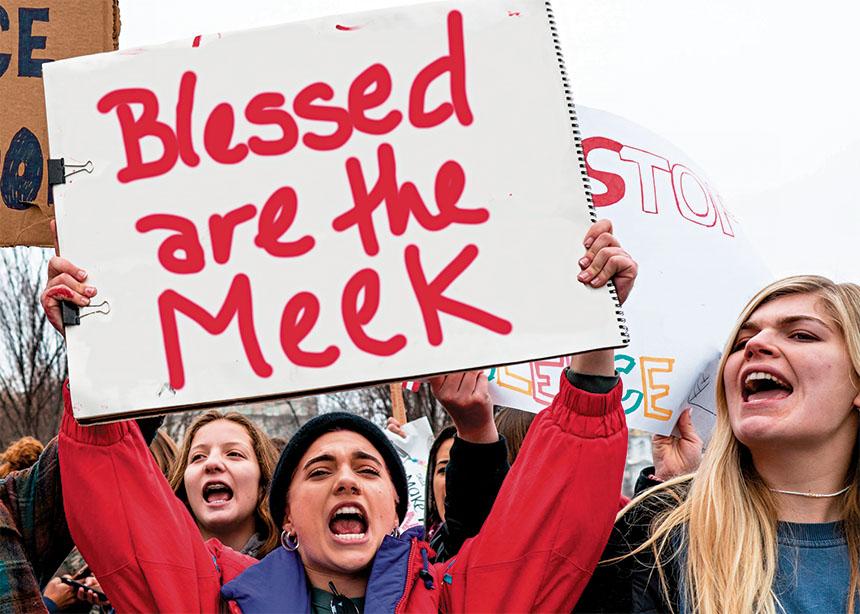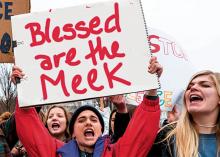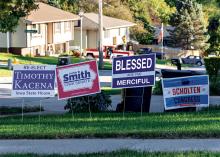When conservative Christians in the southern U.S. were agitating to erect monuments with the 10 commandments on them in front of courthouses, I heard someone suggest that they put up the Beatitudes instead.
The idea stuck with me, as did the reaction of my Trump-loving, warm-hearted neighbour when I floated the idea by her. She loved it.
Are the Beatitudes not a potent biblical antidote to polarization?
Blessed are the poor, those who mourn, the meek, those who hunger and thirst for righteousness, the merciful, the pure in heart, the peacemakers and those who are persecuted.
It’s hard to stoke anger with the Beatitudes. They would serve poorly as battle cries.
As a next step in my journey to address polarization, I wanted to test whether the Beatitudes could offer a transcendent approach to divisive issues, a way to rise above difference.
My desire to address polarization is solidified by two types of responses I, as editor, receive from readers of Canadian Mennonite. The most common feedback, by far, is appreciation for efforts in the magazine to deal with tensions in a constructive way and cross lines of division with an open heart, as we did in relation to COVID. Many people live with tension in their circles. The discussion is live.
The editorial that received the most positive feedback was one in which I discussed four items in that issue of the magazine that did not sit well with me and also contained gems of value. Not everyone appreciates nuance and complexity, but for those of you who do, know that you are in good company.
I imagined doing much more depolarization work in the magazine, but it’s tricky business. That leads to the second category of reader feedback I will mention.
We hear from people who have legitimate questions but are afraid to speak publicly. They do not want to be shot down by the vocal left. Good-hearted people feel stranded on the sidelines. (In other ways, the vocal left has brought healing and important change.)
It is difficult, for instance, to find two people of differing views to write side-by-side articles that all the nuance-loving readers would appreciate.
All of this motivates me to think more rigorously about de-polarization. That brings me back to the Beatitudes and my most recent experiment.
Landfill search
With my heart tuned to the blessed Beatitudes, I set out to explore a particularly complex and contentious issue: the tragic case of Morgan Harris and Marcedes Myran, Indigenous women who were murdered, their bodies dumped in a landfill near Winnipeg, where they remain.
In addition to the reading I did on the topic, I spoke with numerous people, Indigenous and not.
In previous writings on polarized issues, I have tried to humanize enemies and humble myself. My latest effort went in a different direction.
Police believe Harris and Myran were killed in May 2022 and dumped in a particular block of the Prairie Green Landfill. Two solidarity camps have been set up to honour the memory of the women and call for justice. The women are among thousands of Indigenous women, girls and two-spirit people who have been murdered or gone missing in Canada.
This particular case has drawn much media and public attention. The symbolism is stark: Indigenous women should not be treated like garbage.
The case of Myran and Harris has boiled down to a question of whether governments will fund a multimillion-dollar search for the bodies. At its worst, this became a point of malicious partisan manipulation in Manitoba’s recent provincial election. A clear battle line emerged: to fund, or not.
This battle matters. The families have made this clear.
Holding that truth, there are also other starting points, other paths into the broader issue of violence against Indigenous women.
Mourning
Dorothy Fontaine spends a lot of time with Indigenous families who have lost loved ones. She speaks with tenderness of their unimaginable grief—in many cases, the ache of not knowing if a mother, sister, auntie, daughter is alive. She sometimes brings families to Camp Assiniboia, located near Winnipeg, where she serves as director of Camps with Meaning for Mennonite Church Manitoba. The camp setting offers refuge and solace.
Camp Assiniboia is planning to build a cabin dedicated to hosting families of those missing and murdered.
Dorothy talks about attending many vigils and memorial walks over the years. Sometimes a painfully small number of people show up—a handful or two. She say at times it feels like society really does not care about families and their loved ones.
Dorothy is passionate, in a gentle way, about Christians being present where people are suffering. “That’s our bread and butter,” she says. Can we show up at vigils and memorial walks? Can we show families and society that someone does care, that their loved ones do matter?
These are not political events, she stresses. They are times of spirit. They are points of potential connection. Showing care, by walking alongside families, is core.
Blessed are those who mourn. Blessed are those who are treated like garbage. God holds them.
Circles of support
As I pondered the complexity of addressing something as multi-faceted as missing and murdered Indigenous women and girls, I thought of Circles of Support and Accountability (CoSA). This program, which has Mennonite roots, surrounds released sexual offenders with caring people who offer regular, in-person support and accountability. CoSA directly and effectively reduces sexual violence against women. In all likelihood it has prevented violence against Indigenous people.
If church folk feel compelled to action by the case of Harris and Myran, volunteering with one of the CoSA chapters, or prison visitation programs, across the country would make sense. This quiet, behind-the-scenes work would feel very different than standing at a rally. Or, perhaps standing at a rally might feel different if one had the CoSA experience as context.
Blessed are the merciful. Blessed are all those wounded by violence.
Like the work Dorothy Fontaine invites churches to, the CoSA possibility offers a depolarized path in.
Zoom out
Most of the people I spoke with wanted to zoom out from the specific funding battle. Without diminishing the importance of the actual search, people were uncomfortable with the way in which the focus has landed on a politicized funding decision, something which happened, in part, because the provincial government—which has since been voted out—refused to fund the search.
The desire to refocus brought me back to a 2016 conversation I had with the late Bill Phipps, former moderator of the United Church of Canada and dedicated worker for reconciliation and environmental well-being.
We were discussing climate and proposed pipelines. He warned against getting drawn into one-off battles over individual projects. Those battles, he said, distract from the larger conversations about where we want to go as a society. They lean into division.
Phipps lived in Alberta and had friends in the oil sector. My first thought about his comment was that he was going soft. Every thought about it since then has made me more convinced of the wisdom of his caution.
Blessed are the peacemakers. Blessed are those who take an expansive view of justice struggles.
We must hold urgency and patience in tension. We must attend to the big picture, the long game, perhaps while also supplying muffins, or drafting press releases, for those in the heat of battle.
How to struggle
Of course, when people mourn with those on the margins and sit around fires on the fringes, often it will lead to requests to be directly involved in addressing abuses of power. It may lead to contentious, adversarial struggles.
Mennonites have a notable history of solidarity with Indigenous justice struggles. Historically, when we have officially participated in blockades or public inquiries that put us in the national media spotlight, the involvement has arisen from long-standing relationships with a community. This lends credibility, depth, understanding and guidance. The Beatitudinal work has gone before.
In the case of the landfill search, Mennonite Church Canada—which can only take a public stand with approval of the regional churches—issued a brief statement “urging governments to #searchthelandfill,” as the press release put it.
While the statement lacks the relational backing of past public stands, I was glad to learn of one significant personal connection. As leaders of other denominations were preparing to gather in Winnipeg to support of the families of Harris and Myran, the grand chief of the Assembly of Manitoba Chiefs, Cathy Merrick, reached out to Mennonites. This was not out of the blue.
As a young child, Merrick spent some time living as a foster child in the home of Otto and Margaret Hamm, who served with Mennonite Pioneer Mission in Merrick’s northern home community of Pimicikamak (Cross Lake). She has maintained contact with Hamm family members in Manitoba.
With other church leaders supporting the families, Merrick, via her foster brother, asked where the Mennonites were. We responded with the statement and participation in an ecumenical event.
This connection with Grand Chief Merrick provides another path in. It’s an opportunity to nurture connection and explore options. Merrick is a person of uncommon warmth and resolve. We would benefit from voices like hers in our sanctuaries and church basements.
Learnings
When I listen to my staunchly progressive friends and ardently conservative friends talk about those in the other camp, I hear the same thing. I hear incredulity and disdain. I sense agitation, a searching for solid ground. I know those feelings.
When I tune in to the Beatitudes, I feel something different. I feel something more difficult and much more compelling.
It was not difficult to find non-divisive avenues of engagement related to the case of the two murdered women. That may not be the case for every issue, but it may be, if we can rise above, step back, lead with the heart and attend to the blessedness.
I cannot imagine my progressive and conservative friends having a useful discussion about funding for a landfill search, but I can imagine them working side-by-side on a cabin build or sitting together around a CoSA circle or calmly discussing the Beatitudes.






Comments
I do think it is useful, as former United Church moderator Bill Phipps pointed out, that we keep our eye on the "big picture." The big picture as far as polarization goes, is that Christianity itself is very polarizing, binary, in/out, heaven/hell, believer/non-believer, etc.
I think that the big picture as far as the "Search the Landfill" and Missing and Murdered Indigenous Women and Girls issue goes, is the issue of the injustice of European settler colonialism and its genocidal impact on First Nations peoples. The depriving of First Nations peoples to the land and access to the land, has resulted in cultural genocide. That is the opinion of Andrew Woolford, former president of the International Association of Genocide Studies and currently a sociology professor at the University of Manitoba, cited in a 2019 on-line discussion about cultural genocide in "Facing History & Ourselves - Canada."
Mennonite settlers in Manitoba post 1874, occupied approximately 576,000 of Treaty 1 land, compliments of Canadian Crown genocidal policy of "absorbing the Indian into the body politic." Settler colonialism became the instrument through which Crown policy was implemented. Knowingly or unknowingly, we became the "foot soldiers of genocide."
The Beatitudes can be useful in this regard, specifically, "blessed be those who hunger and search for righteousness," (justice). MC Canada has historically provided only tepid support for "Indigenous issues". But this is not an Indigenous issue, it is a Mennonite Christian injustice issue. We need to get past the idea of the "Indian problem." MC Canada does not need regional support to advocate for God's justice. Who will do the Lord's work, if not the Lord's people?"
Add new comment
Canadian Mennonite invites comments and encourages constructive discussion about our content. Actual full names (first and last) are required. Comments are moderated and may be edited. They will not appear online until approved and will be posted during business hours. Some comments may be reproduced in print.